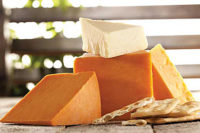Eating baked goods that contain milk may help children get over milk allergies, a new study suggests.
Children with food allergies were given cooked milk baked into muffins over the course of months or years. Results showed that their symptoms disappeared faster than children who simply avoided milk products altogether.
Researchers say their results have the potential to change how kids are treated for milk allergies, which affect as many as 3% of young children, according to the National Institute of Allergy and Infectious Disease, Bethesda, Md.
In the study, milk-allergic kids who were able to tolerate the muffins from the start were also more likely to eventually grow out of their milk allergies, hinting at the possibility of a muffin test to distinguish transient allergies from more severe ones.
The study is "a step in the direction of...providing a more personalized approach for treating food allergies," says co-author Anna Nowak-Wegrzyn of the Mount Sinai Medical Center in New York. "One approach is not right for all children with milk allergy. The majority does not need to and should not strictly avoid milk."
In the study, researchers gave 88 milk-allergic children between 2 and 17 years old baked goods that included milk, and compared them to a group of 60 allergic children who followed the standard treatment, which is strict avoidance of milk products. Just under half of children in the experimental group were able to consume dairy products such as skim milk or yogurt without having allergic reactions by the end of the study period. That compared to less than a quarter of the group that avoided milk products, the authors reported in The Journal of Allergy and Clinical Immunology.
The idea behind the muffin experiment is that heating milk changes the shape of the proteins and lessens the chance that the immune system will react to them.
Among children who eventually outgrew their milk allergies, the ones who received the muffin therapy did so faster than the kids who avoided milk, suggesting that the exposure also helped to hasten the process.
The findings "run contrary to what we thought several years ago" about how childhood milk allergies are treated, and will help "challenge older dogma," says Wesley Burks, chief of pediatric allergy and immunology at Duke University Hospital, Durham, N.C.
SOURCE: bit.ly/iHEA9w The Journal of Allergy and Clinical Immunology, online May 23, 2011.
Get our new eMagazine delivered to your inbox every month.
Stay in the know on the latest dairy industry trends.
SUBSCRIBE TODAYCopyright ©2024. All Rights Reserved BNP Media.
Design, CMS, Hosting & Web Development :: ePublishing

